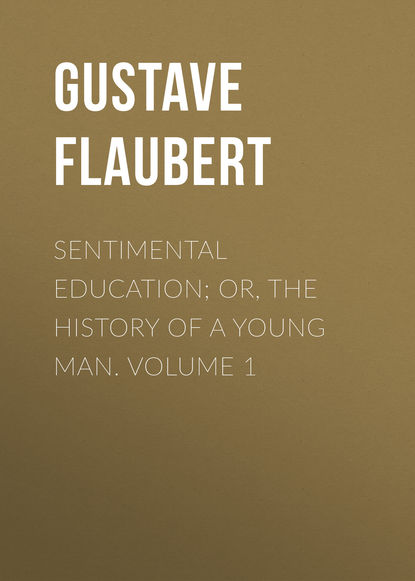По всем вопросам обращайтесь на: info@litportal.ru
(©) 2003-2024.
✖
Sentimental Education; Or, The History of a Young Man. Volume 1
Настройки чтения
Размер шрифта
Высота строк
Поля
"Why, the thing is perfectly plain. It is time that politics should be dealt with scientifically. The old men of the eighteenth century began it when Rousseau and the men of letters introduced into the political sphere philanthropy, poetry, and other fudge, to the great delight of the Catholics – a natural alliance, however, since the modern reformers (I can prove it) all believe in Revelation. But, if you sing high masses for Poland, if, in place of the God of the Dominicans, who was an executioner, you take the God of the Romanticists, who is an upholsterer, if, in fact, you have not a wider conception of the Absolute than your ancestors, Monarchy will penetrate underneath your Republican forms, and your red cap will never be more than the headpiece of a priest. The only difference will be that the cell system will take the place of torture, the outrageous treatment of Religion that of sacrilege, and the European Concert that of the Holy Alliance; and in this beautiful order which we admire, composed of the wreckage of the followers of Louis XIV., the last remains of the Voltaireans, with some Imperial white-wash on top, and some fragments of the British Constitution, you will see the municipal councils trying to give annoyance to the Mayor, the general councils to their Prefect, the Chambers to the King, the Press to Power, and the Administration to everybody. But simple-minded people get enraptured about the Civil Code, a work fabricated – let them say what they like – in a mean and tyrannical spirit, for the legislator, in place of doing his duty to the State, which simply means to observe customs in a regular fashion, claims to model society like another Lycurgus. Why does the law impede fathers of families with regard to the making of wills? Why does it place shackles on the compulsory sale of real estate? Why does it punish as a misdemeanour vagrancy, which ought not even to be regarded as a technical contravention of the Code. And there are other things! I know all about them! and so I am going to write a little novel, entitled 'The History of the Idea of Justice,' which will be amusing. But I am infernally thirsty! And you?"
He leaned out through the window, and called to the porter to go and fetch them two glasses of grog from the public-house over the way.
"To sum up, I see three parties – no! three groups – in none of which do I take the slightest interest: those who have, those who have nothing, and those who are trying to have. But all agree in their idiotic worship of Authority! For example, Mably recommends that the philosophers should be prevented from publishing their doctrines; M. Wronsky, the geometrician, describes the censorship as the 'critical expression of speculative spontaneity'; Père Enfantin gives his blessing to the Hapsburgs for having passed a hand across the Alps in order to keep Italy down; Pierre Leroux wishes people to be compelled to listen to an orator; and Louis Blanc inclines towards a State religion – so much rage for government have these vassals whom we call the people! Nevertheless, there is not a single legitimate government, in spite of their sempiternal principles. But 'principle' signifies 'origin.' It is always necessary to go back to a revolution, to an act of violence, to a transitory fact. Thus, our principle is the national sovereignty embodied in the Parliamentary form, though the Parliament does not assent to this! But in what way could the sovereignty of the people be more sacred than the Divine Right? They are both fictions. Enough of metaphysics; no more phantoms! There is no need of dogmas in order to get the streets swept! It will be said that I am turning society upside down. Well, after all, where would be the harm of that? It is, indeed, a nice thing – this society of yours."
Frederick could have given many answers. But, seeing that his theories were far less advanced than those of Sénécal, he was full of indulgence towards Deslauriers. He contented himself with arguing that such a system would make them generally hated.
"On the contrary, as we should have given to each party a pledge of hatred against his neighbour, all will reckon on us. You are about to enter into it yourself, and to furnish us with some transcendent criticism!"
It was necessary to attack accepted ideas – the Academy, the Normal School, the Consérvatoire, the Comédie Française, everything that resembled an institution. It was in that way that they would give uniformity to the doctrines taught in their review. Then, as soon as it had been thoroughly well-established, the journal would suddenly be converted into a daily publication. Thereupon they could find fault with individuals.
"And they will respect us, you may be sure!"
Deslauriers touched upon that old dream of his – the position of editor-in-chief, so that he might have the unutterable happiness of directing others, of entirely cutting down their articles, of ordering them to be written or declining them. His eyes twinkled under his goggles; he got into a state of excitement, and drank a few glasses of brandy, one after the other, in an automatic fashion.
"You'll have to stand me a dinner once a week. That's indispensable, even though you should have to squander half your income on it. People would feel pleasure in going to it; it would be a centre for the others, a lever for yourself; and by manipulating public opinion at its two ends – literature and politics – you will see how, before six months have passed, we shall occupy the first rank in Paris."
Frederick, as he listened to Deslauriers, experienced a sensation of rejuvenescence, like a man who, after having been confined in a room for a long time, is suddenly transported into the open air. The enthusiasm of his friend had a contagious effect upon him.
"Yes, I have been an idler, an imbecile – you are right!"
"All in good time," said Deslauriers. "I have found my Frederick again!"
And, holding up his jaw with closed fingers:
"Ah! you have made me suffer! Never mind, I am fond of you all the same."
They stood there gazing into each other's faces, both deeply affected, and were on the point of embracing each other.
A woman's cap appeared on the threshold of the anteroom.
"What brings you here?" said Deslauriers.
It was Mademoiselle Clémence, his mistress.
She replied that, as she happened to be passing, she could not resist the desire to go in to see him, and in order that they might have a little repast together, she had brought some cakes, which she laid on the table.
"Take care of my papers!" said the advocate, sharply. "Besides, this is the third time that I have forbidden you to come at my consultation-hours."
She wished to embrace him.
"All right! Go away! Cut your stick!"
He repelled her; she heaved a great sigh.
"Ah! you are plaguing me again!"
"'Tis because I love you!"
"I don't ask you to love me, but to oblige me!"
This harsh remark stopped Clémence's tears. She took up her station before the window, and remained there motionless, with her forehead against the pane.
Her attitude and her silence had an irritating effect on Deslauriers.
"When you have finished, you will order your carriage, will you not?"
She turned round with a start.
"You are sending me away?"
"Exactly."
She fixed on him her large blue eyes, no doubt as a last appeal, then drew the two ends of her tartan across each other, lingered for a minute or two, and went away.
"You ought to call her back," said Frederick.
"Come, now!"
And, as he wished to go out, Deslauriers went into the kitchen, which also served as his dressing-room. On the stone floor, beside a pair of boots, were to be seen the remains of a meagre breakfast, and a mattress with a coverlid was rolled up on the floor in a corner.
"This will show you," said he, "that I receive few marchionesses. 'Tis easy to get enough of them, ay, faith! and some others, too! Those who cost nothing take up your time – 'tis money under another form. Now, I'm not rich! And then they are all so silly, so silly! Can you chat with a woman yourself?"
As they parted, at the corner of the Pont Neuf, Deslauriers said: "It's agreed, then; you'll bring the thing to me to-morrow as soon as you have it!"
"Agreed!" said Frederick.
When he awoke next morning, he received through the post a cheque on the bank for fifteen thousand francs.
This scrap of paper represented to him fifteen big bags of money; and he said to himself that, with such a sum he could, first of all, keep his carriage for three years instead of selling it, as he would soon be forced to do, or buy for himself two beautiful damaskeened pieces of armour, which he had seen on the Quai Voltaire, then a quantity of other things, pictures, books and what a quantity of bouquets of flowers, presents for Madame Arnoux! anything, in short, would have been preferable to risking losing everything in that journal! Deslauriers seemed to him presumptuous, his insensibility on the night before having chilled Frederick's affection for him; and the young man was indulging in these feelings of regret, when he was quite surprised by the sudden appearance of Arnoux, who sat down heavily on the side of the bed, like a man overwhelmed with trouble.
"What is the matter now?"
"I am ruined!"
He had to deposit that very day at the office of Maître Beaumont, notary, in the Rue Saint-Anne, eighteen thousand francs lent him by one Vanneroy.
"'Tis an unaccountable disaster. I have, however, given him a mortgage, which ought to keep him quiet. But he threatens me with a writ if it is not paid this afternoon promptly."
"And what next?"
"Oh! the next step is simple enough; he will take possession of my real estate. Once the thing is publicly announced, it means ruin to me – that's all! Ah! if I could find anyone to advance me this cursed sum, he might take Vanneroy's place, and I should be saved! You don't chance to have it yourself?"
The cheque had remained on the night-table near a book. Frederick took up a volume, and placed it on the cheque, while he replied:
"Good heavens, my dear friend, no!"
But it was painful to him to say "no" to Arnoux.
He leaned out through the window, and called to the porter to go and fetch them two glasses of grog from the public-house over the way.
"To sum up, I see three parties – no! three groups – in none of which do I take the slightest interest: those who have, those who have nothing, and those who are trying to have. But all agree in their idiotic worship of Authority! For example, Mably recommends that the philosophers should be prevented from publishing their doctrines; M. Wronsky, the geometrician, describes the censorship as the 'critical expression of speculative spontaneity'; Père Enfantin gives his blessing to the Hapsburgs for having passed a hand across the Alps in order to keep Italy down; Pierre Leroux wishes people to be compelled to listen to an orator; and Louis Blanc inclines towards a State religion – so much rage for government have these vassals whom we call the people! Nevertheless, there is not a single legitimate government, in spite of their sempiternal principles. But 'principle' signifies 'origin.' It is always necessary to go back to a revolution, to an act of violence, to a transitory fact. Thus, our principle is the national sovereignty embodied in the Parliamentary form, though the Parliament does not assent to this! But in what way could the sovereignty of the people be more sacred than the Divine Right? They are both fictions. Enough of metaphysics; no more phantoms! There is no need of dogmas in order to get the streets swept! It will be said that I am turning society upside down. Well, after all, where would be the harm of that? It is, indeed, a nice thing – this society of yours."
Frederick could have given many answers. But, seeing that his theories were far less advanced than those of Sénécal, he was full of indulgence towards Deslauriers. He contented himself with arguing that such a system would make them generally hated.
"On the contrary, as we should have given to each party a pledge of hatred against his neighbour, all will reckon on us. You are about to enter into it yourself, and to furnish us with some transcendent criticism!"
It was necessary to attack accepted ideas – the Academy, the Normal School, the Consérvatoire, the Comédie Française, everything that resembled an institution. It was in that way that they would give uniformity to the doctrines taught in their review. Then, as soon as it had been thoroughly well-established, the journal would suddenly be converted into a daily publication. Thereupon they could find fault with individuals.
"And they will respect us, you may be sure!"
Deslauriers touched upon that old dream of his – the position of editor-in-chief, so that he might have the unutterable happiness of directing others, of entirely cutting down their articles, of ordering them to be written or declining them. His eyes twinkled under his goggles; he got into a state of excitement, and drank a few glasses of brandy, one after the other, in an automatic fashion.
"You'll have to stand me a dinner once a week. That's indispensable, even though you should have to squander half your income on it. People would feel pleasure in going to it; it would be a centre for the others, a lever for yourself; and by manipulating public opinion at its two ends – literature and politics – you will see how, before six months have passed, we shall occupy the first rank in Paris."
Frederick, as he listened to Deslauriers, experienced a sensation of rejuvenescence, like a man who, after having been confined in a room for a long time, is suddenly transported into the open air. The enthusiasm of his friend had a contagious effect upon him.
"Yes, I have been an idler, an imbecile – you are right!"
"All in good time," said Deslauriers. "I have found my Frederick again!"
And, holding up his jaw with closed fingers:
"Ah! you have made me suffer! Never mind, I am fond of you all the same."
They stood there gazing into each other's faces, both deeply affected, and were on the point of embracing each other.
A woman's cap appeared on the threshold of the anteroom.
"What brings you here?" said Deslauriers.
It was Mademoiselle Clémence, his mistress.
She replied that, as she happened to be passing, she could not resist the desire to go in to see him, and in order that they might have a little repast together, she had brought some cakes, which she laid on the table.
"Take care of my papers!" said the advocate, sharply. "Besides, this is the third time that I have forbidden you to come at my consultation-hours."
She wished to embrace him.
"All right! Go away! Cut your stick!"
He repelled her; she heaved a great sigh.
"Ah! you are plaguing me again!"
"'Tis because I love you!"
"I don't ask you to love me, but to oblige me!"
This harsh remark stopped Clémence's tears. She took up her station before the window, and remained there motionless, with her forehead against the pane.
Her attitude and her silence had an irritating effect on Deslauriers.
"When you have finished, you will order your carriage, will you not?"
She turned round with a start.
"You are sending me away?"
"Exactly."
She fixed on him her large blue eyes, no doubt as a last appeal, then drew the two ends of her tartan across each other, lingered for a minute or two, and went away.
"You ought to call her back," said Frederick.
"Come, now!"
And, as he wished to go out, Deslauriers went into the kitchen, which also served as his dressing-room. On the stone floor, beside a pair of boots, were to be seen the remains of a meagre breakfast, and a mattress with a coverlid was rolled up on the floor in a corner.
"This will show you," said he, "that I receive few marchionesses. 'Tis easy to get enough of them, ay, faith! and some others, too! Those who cost nothing take up your time – 'tis money under another form. Now, I'm not rich! And then they are all so silly, so silly! Can you chat with a woman yourself?"
As they parted, at the corner of the Pont Neuf, Deslauriers said: "It's agreed, then; you'll bring the thing to me to-morrow as soon as you have it!"
"Agreed!" said Frederick.
When he awoke next morning, he received through the post a cheque on the bank for fifteen thousand francs.
This scrap of paper represented to him fifteen big bags of money; and he said to himself that, with such a sum he could, first of all, keep his carriage for three years instead of selling it, as he would soon be forced to do, or buy for himself two beautiful damaskeened pieces of armour, which he had seen on the Quai Voltaire, then a quantity of other things, pictures, books and what a quantity of bouquets of flowers, presents for Madame Arnoux! anything, in short, would have been preferable to risking losing everything in that journal! Deslauriers seemed to him presumptuous, his insensibility on the night before having chilled Frederick's affection for him; and the young man was indulging in these feelings of regret, when he was quite surprised by the sudden appearance of Arnoux, who sat down heavily on the side of the bed, like a man overwhelmed with trouble.
"What is the matter now?"
"I am ruined!"
He had to deposit that very day at the office of Maître Beaumont, notary, in the Rue Saint-Anne, eighteen thousand francs lent him by one Vanneroy.
"'Tis an unaccountable disaster. I have, however, given him a mortgage, which ought to keep him quiet. But he threatens me with a writ if it is not paid this afternoon promptly."
"And what next?"
"Oh! the next step is simple enough; he will take possession of my real estate. Once the thing is publicly announced, it means ruin to me – that's all! Ah! if I could find anyone to advance me this cursed sum, he might take Vanneroy's place, and I should be saved! You don't chance to have it yourself?"
The cheque had remained on the night-table near a book. Frederick took up a volume, and placed it on the cheque, while he replied:
"Good heavens, my dear friend, no!"
But it was painful to him to say "no" to Arnoux.

















